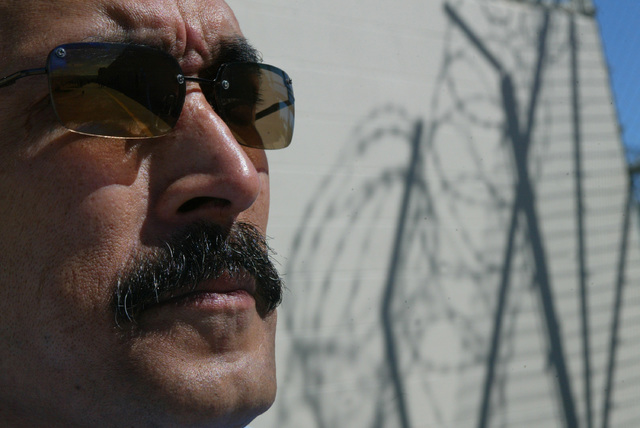Parole board gives ex-Mexican Mafia killer another chance at freedom

LOS ANGELES TIMES / TRIBUNE NEWS SERVICE
Rene Enriquez in 2005; the former member of the Mexican Mafia now speaks before business and police groups about the internal workings of the gang.
LOS ANGELES » A convicted killer and former shot-caller for the Mexican Mafia who developed an unusually close relationship with law enforcement was again granted parole today, a year after the governor rejected his previous bid for freedom.
During a hearing before a California parole board, Rene “Boxer” Enriquez spoke for more than three hours as he made his case for release, insisting he had changed and promising that he had stopped drugs and had gone through several self-help courses.
He pointed to his extensive collaboration with law enforcement, which began more than a decade ago when he left the notorious prison gang.
The adult children of one of Enriquez’s murder victims begged the board to keep their mother’s killer behind bars. After the decision was announced, Cynthia Gavaldon’s children said they felt “defeated.”
“I believe that everybody is capable of change,” said her son, who asked that his name not be published out of concerns for his safety. “But you can’t go from a devil to an angel.”
After just under 30 minutes of deliberation, the two-person parole panel announced its decision. Commissioner John Peck acknowledged that Enriquez’s crimes were “horrific” but said they believed Enriquez had changed since dropping out of the gang.
Don't miss out on what's happening!
Stay in touch with breaking news, as it happens, conveniently in your email inbox. It's FREE!
Rehabilitation classes have helped reduce the threat Enriquez posed to the community, Peck said. He had “solid parole plans and a significant amount of support,” Peck said. The commissioner also noted the “volumes of support letters” Enriquez had received.
“We believe you have insight into your behaviors … and how you can avoid those behaviors in the future,” he told Enriquez.
The second commissioner, Nga Lam, said she felt Enriquez had addressed the concerns the governor outlined last year when rejecting his parole. “I wish you luck,” she said.
“Thank you all so much,” Enriquez said. “God bless you all.”
Enriquez grabbed a water bottle, tucked a file under his arm and walked out of the room.
Friday’s decision marked the second time since September 2014 that a state board determined Enriquez no longer posed a risk to society and was suitable for parole. Enriquez is serving a life term for two murders — including the killing of Gavaldon in 1989 — and an assault. He’s been in prison for more than two decades.
After Friday’s ruling is reviewed by the parole board’s legal staff, it will be forwarded to Gov. Jerry Brown, who can decide to block Enriquez’s release.
Prison officials declined to allow reporters to attend Enriquez’s latest hearing out of concern for the inmate’s security, but a Los Angeles Times reporter was allowed to view the hearing on a closed-circuit camera that broadcast from the parole board’s room.
Enriquez was sharply dressed at the hearing, his hair slicked back and cut short on the sides. He sat straight up in his chair — like a businessman at a board meeting — as he spoke to the board, detailing his childhood, drug use and criminal convictions, which include a gang rape and two killings.
He referred to the controversy that surrounded him last year after Los Angeles police brought him to speak to a group of elite business owners at a private downtown event. The January 2015 lecture, which was widely reported in the media, prompted criticism and questions about Enriquez’s involvement with authorities.
Soon after, Enriquez said, Brown denied his parole. Then, the inmate’s mother died. Enriquez called it one of the “most difficult” periods of his life — “blow after blow after blow.”
“I was on the cusp of parole, and then it was reversed,” he said.
Enriquez’s relationship with law enforcement began more than a decade ago, when he left the Mexican Mafia and agreed to tell investigators about the inner workings of the notorious prison gang.
Enriquez has provided expert testimony in scores of cases. He has collaborated on books, filmed training videos for police, even taught a college course via Skype. He has lectured at law enforcement conferences across the state — and at the private event that became a controversial episode for the LAPD.
As part of Enriquez’s last parole hearing in September 2014, officials from 11 different law enforcement agencies submitted letters on his behalf.
A three-person board initially granted Enriquez parole, determining that he had “engaged in a positive period of rehabilitation” and no longer was a danger to society. But the governor reversed the decision last February.
Brown acknowledged the “positive steps” Enriquez had taken and the “valuable information” he had provided authorities. But the governor expressed doubt that the former shot-caller had “deeply examined or forthrightly explained” his criminal history or gang involvement.
“Mr. Enriquez presents a rather shallow understanding of how he came to perpetuate so many extremely violent crimes,” the governor wrote in his reversal. “I find the evidence shows that he currently poses an unreasonable danger to society if released.”
——
©2016 Los Angeles Times



